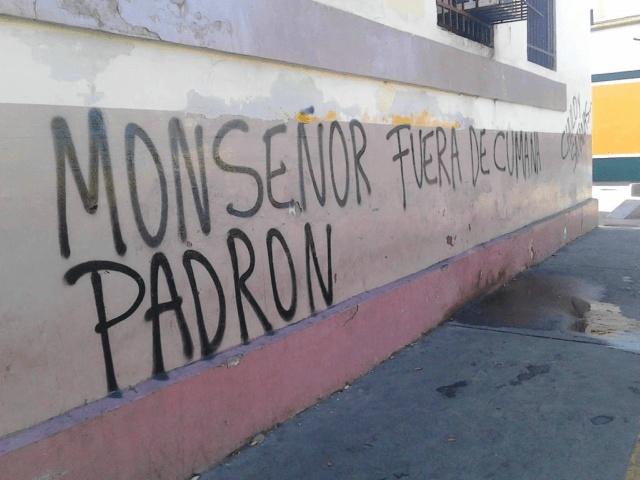Pro-socialist vandals targeted the walls of Venezuela’s Cumaná Cathedral and its surroundings with threatening anti-Catholic messages Tuesday night, referring to Cumaná’s archbishop as “Monsignor Satan” after dictator Nicolás Maduro targeted clergymen in a television broadcast this week.
Monsignor Diego Padrón, Archbishop of Cumaná, had signed a letter of support for priests the government targeted after delivering homilies lamenting the tragic state of the nation. Maduro had referred to Padrón and other anti-socialist priests as “devils in cassocks” and threatened to prosecute them with a “law against hate” his supporters passed that grants the Venezuelan government extended powers to silence critics.
The graffiti outside the cathedral on Wednesday included slogans like “Monsignor Satan,” “Monsignor Pimp,” “Monsignor Padrón Out,” and “Sadist, Get Out” according to photos published by the Venezuelan Episcopal Conference (CEV) on Twitter.
“What happened yesterday was graffitied overnight,” Padrón explained in an interview Wednesday on the program En la Unión está la Fuerza, according to Colombia’s NTN24 News. “It is a reaction—by the government, we assume—against a communique from the eastern bishops in solidarity with bishops in Barquisimeto … who expressed their discontent with the situation in the country.”
The incident is far from the first time that the Catholic Church has come under attack in socialist Venezuela. Chavista thugs have vandalized churches, assaulted bishops, and trapped believers in churches to force them to listen to socialist rants repeatedly throughout Maduro’s tenure.
Padrón and several other Catholic leaders had issued statements in support of the priests Maduro had targeted on his broadcast. Among those specifically mentioned on state television was Víctor Hugo Basabe, bishop of San Felipe, who had called for Maduro’s ouster during his homily this weekend. Basabe told his congregation that the socialists “are stubbornly refusing to accept that the fundamental cause of all the ills in Venezuela is the insistence on an economic, political, and social model that denies God and human dignity.”
“We must look into … whether these words emitted by some of these characters are not truly hate crimes that appear to generate confrontation among Venezuelans,” Maduro warned in the same broadcast that he referred to Basabe and Padrón as “devils.”
On January 19, in response to government threats, the CEV published a statement on behalf of the nation’s Catholic leadership condemning Maduro’s regime.
“In their own words, our bishops described situations that we are living as a country, where every day there are more shortages and needs before our beloved people of Venezuela,” the statement read. “As pastors of the Church, Mother and Teacher, we are called to proclaim the truth, even if this truth discomforts some sectors of the government who do not want to hear it.”
The statement particularly issued to the priests targeted “our solidarity and fraternal prayer for them and all our Bishops.”
The CEV had previously condemned the threatened use of the “law against hate” against Catholic believers. “The government, with the law against hate and intolerance … has criminalized all manifestations against it,” the CEV argued in a January 12 statement.
“We express what is going on in the country to competent organizations and, if they do not want to debate it, we do it publicly so that things are corrected,” the president of the CEV, José Luis Azuaje, told the Spanish newspaper ABC.
In protesting the government’s use of the “law against hate” to silence them, the bishops have found in American Ambassador to the United Nations Nikki Haley an ally.
“Maduro’s reign of violence, repression, corruption, and bankruptcy continues to punish the Venezuelan people,” Haley said in a statement this weekend. “By targeting religious leaders … this regime continues to show that it cares only for preserving its own power and cares nothing about the basic human rights and welfare of its citizens.”

COMMENTS
Please let us know if you're having issues with commenting.